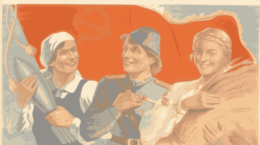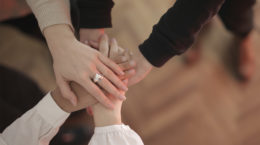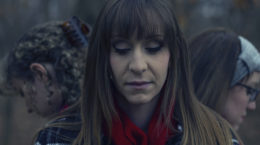Thirty years after the Beijing Declaration, war in Ukraine and authoritarianism across Eastern Europe are erasing decades of progress on gender equality. This report exposes how women are objectified, excluded, and silenced — and calls for urgent feminist action to reclaim peace.
The region of Eastern Europe—encompassing Belarus, Russia, Ukraine, the Baltic States, and Poland—is undergoing an alarming surge in militarization, authoritarianism, and armed violence. Over the past five years, even conservative estimates suggest that more than two million people from Belarus, Ukraine, and Russia have been displaced. The war in Ukraine has not only inflicted devastating human costs within its borders but has deeply destabilized the entire region, exacerbating trauma, worsening poverty, and reversing decades of progress on gender equality.
As the international community commemorates thirty years since the adoption of the Beijing Declaration and Platform for Action, the lived experiences of women in this conflict zone expose a gaping chasm between policy and reality. Drawing on the principles of the Beijing+30 framework, this report examines how the ongoing war undermines progress across all twelve critical areas of concern.
Systemic Objectification of Women in Wartime
Wartime dynamics reduce women to archetypal roles that serve militaristic and patriarchal agendas, stripping them of autonomy:
- Agents of Patriotic Inspiration: Women are expected to encourage men to enlist and fight, portrayed as symbols of virtue to be protected or as muses for male sacrifice.
- Reproductive Instruments: Nationalist discourses valorize women primarily for their reproductive capacity, urging them to “bear the next generation of defenders.”
- Emotional Laborers: Women are pressured to remain loyal to absent or abusive male partners, and to provide unrecognized emotional care to traumatized combatants.
- Auxiliary Labor: Women are mobilized to knit camouflage nets, produce trench candles, raise funds for weapons, and perform other gendered tasks in support of the war machine.
- Propagandists: Some are co-opted into becoming public promoters of militarism, glorifying resistance and denouncing peace efforts as weakness.
These narrow roles silence dissent and neutralize women as political actors. They violate the commitments under Critical Areas D (Violence Against Women) and H (Institutional Mechanisms for the Advancement of Women).
The Spread of Violence and Gendered Exclusion
Militarization normalizes violence across all spheres of life, with disproportionate consequences for women:
- Domestic Violence: Combatants and political prisoners are revered as heroes, even when they engage in abuse. PTSD is often used as a shield to excuse violent behavior.
- Vulnerability in Exile: Refugee women, particularly from Belarus and Russia, face surveillance, intimidation by security services, and limited legal protection.
- Silencing of Peace Voices: Feminist and anti-war advocates are marginalized, censored, or accused of undermining the war effort.
These trends further entrench gendered hierarchies and reinforce Critical Area G (Power and Decision-Making).
The Crisis of Masculinity and Its Impact on Women
Militarized masculinity is celebrated, marginalizing alternative expressions of manhood and exacerbating social divisions:
- Stigmatization of Objectors: Men who reject conscription or desert are ostracized, while their female partners bear the economic and emotional fallout.
- LGBTQ+ Exclusion: Queer identities are further marginalized in militarized societies, where traditional gender roles are aggressively enforced.
- Feminist Repression: Feminist activists and pacifists are criminalized, exiled, or delegitimized.
These dynamics erode progress in Critical Areas E (Women and Armed Conflict) and L (The Girl Child).
The Invisible Labor of Women Peacebuilders
As state institutions crumble or become militarized, women at the grassroots step into the void:
- Unpaid First Responders: Women-led initiatives provide trauma care, legal assistance, shelter, and advocacy under immense pressure.
- Exhaustion and Burnout: With little funding and few protections, these women are vulnerable to emotional collapse.
- Lack of Recognition: Despite their central role in community cohesion, women peacebuilders are routinely excluded from international funding and policy spaces.
This undermines Critical Areas A (Women and Poverty) and I (Human Rights of Women).
Beijing+30: The Dramatical Backsliding of All Twelve Critical Areas
The war in Ukraine and its regional consequences have dramatically set back progress in all twelve areas of the Beijing Platform:
- A. Poverty: Displacement and economic collapse have impoverished women-headed households.
War increases poverty among women-headed households, particularly women refugees and those whose partners were killed, imprisoned, or conscripted.
Displacement disrupts access to income, welfare, and property rights — especially for undocumented or stateless women and girls from Belarus, Russia and Ukraine.
- B. Education: Conflict interrupts education, while militarized curricula reinforce gender stereotypes.
Education is disrupted for girls in war zones and refugee families. Militarized narratives and gender stereotypes infiltrate school systems, emphasizing nationalist roles over critical thinking or gender equality.
Refugee women lack access to professional retraining and higher education in exile, often reduced to informal & illegal labor.
- C. Health: Mental health, reproductive care, and trauma services are deprioritized.
Wartime conditions deprioritize reproductive, maternal, and mental health services.
Many women and girls from Belarus, Russia and Ukraine face untreated trauma, including PTSD, sexual violence, and abuse, with very limited access to psychological support.
- D. Violence: Gender-based violence is on the rise, normalized, and underreported.
Domestic violence has increased in both conflict and post-conflict households, often committed by “heroes” of war.
Wartime sexual violence and trafficking risk increase significantly, especially for displaced women and girls.
Victims often stay silent due to stigma, lack of legal recourse, or fear of retaliation.
- E. Armed Conflict: Women are sidelined from peace processes and persecuted for opposing war.
Women are excluded from formal peace negotiations and security policy-making.
Feminist anti-war activism is criminalized in Russia and Belarus and stigmatized in Ukraine; women objectors and peacebuilders are often forced into exile or silence.
Humanitarian policies rarely incorporate a gender-sensitive lens or engage local women’s groups in planning.
- F. Economy: Women are pushed into informal labor with no protections.
War and violence have displaced women from formal employment, especially in sectors such as education, health, and public administration.
Refugee women from Belarus, Russia and Ukraine are underpaid or exploited in informal and care sectors without protections.
Economic recovery plans rarely center on gender equity or women’s entrepreneurship.
- G. Power and Decision-Making: Militarized governance excludes women from leadership.
Militarization has re-centralized power in patriarchal and authoritarian hands.
Women’s participation in national governments, peace councils, and diaspora leadership has been symbolic at best.
Feminist voices are often ignored or deliberately discredited in political debate.
- H. Institutional Mechanisms: Gender agencies are defunded or dismantled.
State gender mechanisms are weakened or dismantled under war conditions.
In exile, displaced women activists face barriers to funding, legal registration, and institutional legitimacy.
Human rights frameworks are increasingly subordinated to national security agendas.
- I. Human Rights: Repression, surveillance, and statelessness restrict women’s rights.
Mass repression in Belarus and Russia has included torture, imprisonment, and exile of women activists and girls as the children of women activists.
Surveillance and persecution by security services (FSB, KGB, VSD and etc) target women human rights defenders and anti-war activists.
Statelessness and legal insecurity for refugee women and girls undermine their access to justice.
- J. Media: Independent feminist media is censored or delegitimized.
State-controlled media in Russia and Belarus promote traditionalist gender roles, militarism, and war propaganda.
Independent feminist media is censored, exiled, or defunded.
Women peacebuilders struggle to have their narratives heard or legitimized.
- K. Environment: War-induced ecological damage disproportionately affects women.
Environmental degradation due to war (e.g., destruction of energy and water infrastructure) has disproportionate effects on women, especially caretakers and rural residents.
Eco-feminist concerns are sidelined by militaristic development agendas.
- L. The Girl Child: Girls face early marriage, sexual violence, and school dropout.
Girls in war-affected regions are vulnerable to early marriage, sexual exploitation, and forced labor.
Many drop out of school due to poverty, displacement, or security risks.
Psychological trauma among girls refugees from Belarus, Russia and Ukraine remains largely unaddressed.
Recommendations: Feminist Peacebuilding in Times of War
To uphold the Beijing+30 vision, the following must be urgently prioritized:
- Implement UN Resolution 1325: Women must be included in all peace and security decisions.
- Demilitarize Society: End the glorification of war in media, policy, and education.
- Support Men Who Refuse War: Reintegration programs for objectors and deserters are vital.
- Protect Refugee Women and Girls from Belarus, Russia and Ukraine: Host states must offer legal, psychosocial, and physical protection. Stop deportation of women activists and human rights defenders from Belarus and Russia.
- Fund Feminist Networks: Grassroots women’s organizations must be resourced and legitimized.
Conclusion
Thirty years after Beijing, the war in Ukraine reveals how fragile gender equality remains under the weight of militarism and authoritarianism. Feminist peacebuilding is not a luxury—it is essential to sustainable peace. The international community must recognize, amplify, and invest in women’s leadership not only in survival, but in resistance.
The true measure of our commitment to Beijing+30 is whether we stand with women and girls not just in boardrooms and conferences, but in refugee shelters, activist collectives, and the silent corners of post-conflict trauma. The time to act is now.
Olga Karach, International Centre for Civil Initiatives “Our House”
![]()
There are many ways to help Our House.

 The funds donated from this page are intended to support the work of our web-site: we will pay for our hosting, email server, Internet, domain, office rental and communal services.
The funds donated from this page are intended to support the work of our web-site: we will pay for our hosting, email server, Internet, domain, office rental and communal services.
If you’re not a fan of coffee subscriptions or Elon Musk, no worries – you can still support us via Stripe.
It’s quick, secure, and doesn’t require registration.
Just follow this link: 👉 https://buy.stripe.com/4gw6ppaH20UO6MUbII
Or just click on the image below










